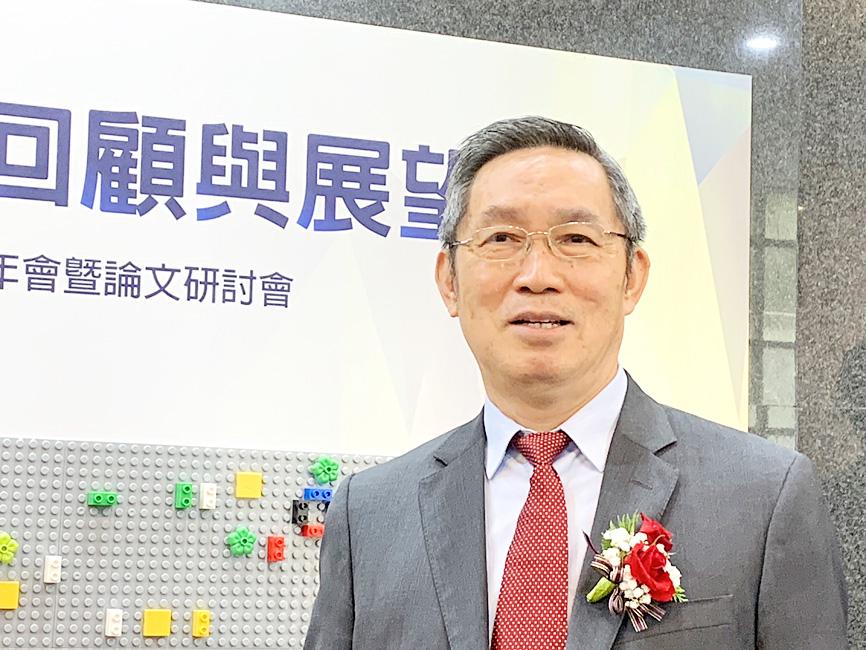Vanguard International Semiconductor Corp (世界先進), a supplier of display driver ICs and power management chips, yesterday predicted that revenue this quarter would expand more than 13 percent sequentially to a new record, mainly due to price hikes amid a persistent imbalance between supply and demand.
Near-term demand is “very strong,” while its longer-term business outlook is underpinned by a structural change in matured 8-inch technology nodes amid scarce supply, as well as the rapid increase in demand that is expected for 5G devices and electric vehicles in next few years, the Hsinchu-based chipmaker said.
“Generally speaking, demand for Vanguard’s foundry services will increase at a constant rate this quarter, greatly enhancing order visibility,” Vanguard chairman Fang Leuh (方略) told investors in an online conference. “We expect factory utilization to remain high for the whole of 2021.”

Photo: Grace Hung, Taipei Times
Demand for driver ICs used for smartphone displays and in other devices shows the greatest growth momentum, which will lead to an increase in 0.18 micron technology and advanced technologies revenue contribution this quarter, Fang said.
Revenue from 0.18 micron and more-advanced technology made up 52 percent of Vanguard’s revenue last quarter following five consecutive quarters of increases, the company said.
Vanguard plans to hike prices by a low-teen percentage this quarter from last quarter, given the favorable supply-demand environment and increases in manufacturing costs, it said.
Shipments are to increase at a quarterly pace of 3 percent this quarter, it said.
To alleviate a supply crunch, Vanguard said it plans this quarter to add about 8,000 wafers a month of capacity at its Taoyuan fab.
The added capacity — which would be for customers who have inked long-term supply agreements — would help Vanguard cope with supply constraints and the rising cost of building new capacity, it said.
The remaining capacity — about 16,000 wafers per month — will be available from the middle of next year, it said.
Gross margin is expected to improve to between 44 and 46 percent this quarter, after reaching a 14-year high of 40.9 percent last quarter, Vanguard said.
The chipmaker attributed the gross margin improvement to price rises, an improved product portfolio and technology upgrades.
The firm does not expect substantial changes in competition from Chinese rivals, Fang said.
There is no imminent risk of order loss to chipmakers operating 12-inch fabs, as cost and production efficiency hurdles are high, he said.
Vanguard operates four fabs, all of which produce 8-inch wafers.
Net profit surged 75.6 percent to NT$2.6 billion (US$93.09 million) in the quarter ended June 30, compared with NT$1.81 billion in the second quarter of last year.
That was a quarterly increase of 17.5 percent from NT$2.21 billion.
That translated into earnings per share of NT$1.58 last quarter, up from NT$0.9 in the second quarter of last year and NT$1.34 in the January-to-March quarter.
Vanguard kept capital expenditure for this year unchanged at NT$8.5 billion.

SEEKING CLARITY: Washington should not adopt measures that create uncertainties for ‘existing semiconductor investments,’ TSMC said referring to its US$165 billion in the US Taiwan Semiconductor Manufacturing Co (TSMC, 台積電) told the US that any future tariffs on Taiwanese semiconductors could reduce demand for chips and derail its pledge to increase its investment in Arizona. “New import restrictions could jeopardize current US leadership in the competitive technology industry and create uncertainties for many committed semiconductor capital projects in the US, including TSMC Arizona’s significant investment plan in Phoenix,” the chipmaker wrote in a letter to the US Department of Commerce. TSMC issued the warning in response to a solicitation for comments by the department on a possible tariff on semiconductor imports by US President Donald Trump’s

The government has launched a three-pronged strategy to attract local and international talent, aiming to position Taiwan as a new global hub following Nvidia Corp’s announcement that it has chosen Taipei as the site of its Taiwan headquarters. Nvidia cofounder and CEO Jensen Huang (黃仁勳) on Monday last week announced during his keynote speech at the Computex trade show in Taipei that the Nvidia Constellation, the company’s planned Taiwan headquarters, would be located in the Beitou-Shilin Technology Park (北投士林科技園區) in Taipei. Huang’s decision to establish a base in Taiwan is “primarily due to Taiwan’s talent pool and its strength in the semiconductor

An earnings report from semiconductor giant and artificial intelligence (AI) bellwether Nvidia Corp takes center stage for Wall Street this week, as stocks hit a speed bump of worries over US federal deficits driving up Treasury yields. US equities pulled back last week after a torrid rally, as investors turned their attention to tax and spending legislation poised to swell the US government’s US$36 trillion in debt. Long-dated US Treasury yields rose amid the fiscal worries, with the 30-year yield topping 5 percent and hitting its highest level since late 2023. Stocks were dealt another blow on Friday when US President Donald

UNCERTAINTY: Investors remain worried that trade negotiations with Washington could go poorly, given Trump’s inconsistency on tariffs in his second term, experts said The consumer confidence index this month fell for a ninth consecutive month to its lowest level in 13 months, as global trade uncertainties and tariff risks cloud Taiwan’s economic outlook, a survey released yesterday by National Central University found. The biggest decline came from the timing for stock investments, which plunged 11.82 points to 26.82, underscoring bleak investor confidence, it said. “Although the TAIEX reclaimed the 21,000-point mark after the US and China agreed to bury the hatchet for 90 days, investors remain worried that the situation would turn sour later,” said Dachrahn Wu (吳大任), director of the university’s Research Center for